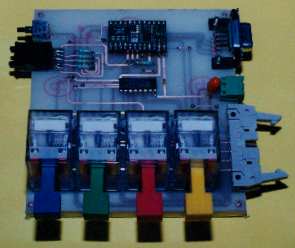

Oskar's Four-bit mazes
Welcome to the Four-bit mazes by M. Oskar van Deventer. All these mazes use just four binary bits to create a sixteen-state maze, yet some mazes are very easy and some very difficult depending on what rule was used during maze construction. Oskar designed many four-bit mazes using different rules, and nine of these mazes are offered in interactive form below.
Details of all rules are listed at the bottom of this page, but can you work out each rule without seeing it? And does actually knowing the rule make the challenge any easier? (the name of each maze may give you a hint). The Four-bit mazes are closely related to my early HTML maze (dropped March 2000, and now re-instated).
|
Oskar's original puzzle is electro-mechanical and is driven by a micro-controller. The aim is to press down all the switches. The micro-controller can both pull down and push up switches using springs and four electromagnets. A photo is shown here on the right. In the applet version the challenge is to switch off four lights. Click below and then select your puzzle from the menu marked Mazes. Warning: this applet is written in Java 1.3 and may not be supported by older browsers |

|
The Rules
All OK: is a training challenge. You can always push
any button, which just clicks the associated light on and off.
Wrong move reset: is a simple four-move challenge. But
one wrong move and you go back to the start.
PIN code: also has a four-move solution, but this time
you do not get immediate feedback that you went down the wrong
path. The maze forks like a tree, and just one "leaf"
is the exit.
Memory: is a real memory test, requiring fifteen moves
to solve, passing through all states. Again, one wrong move and
you go back to the start.
Deeper & deeper: is a progressive maze. As
you switch a light off a maximum of one light will come back
on giving you a feeling of progress through the maze.
Four-Bit maze: is a non-progressive maze. More
than one light may come back on in this maze so it's harder to
tell how well you're doing.
No sense: is even less progressive than Four-Bit,
the change of lights is totally unrelated to the button that
you push.
Karnaugh: is like walking through a Karnaugh diagram.
As in All OK each button only affects its own light, and
you can turn lights both off and on, but this time not all buttons
will be enabled.
One way: is similar to Karnaugh. However once you
have moved forward by pushing a button, the button will always
be left disabled so you cannot simply reverse you last move to
try different options.
concept & maze-design – © M. Oskar van Deventer 2000-2001
applet – © Andrea Gilbert 2001